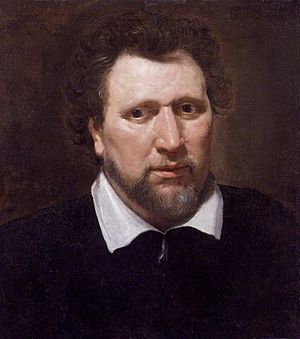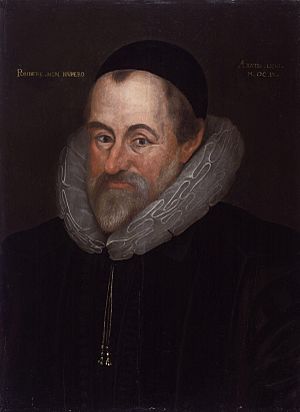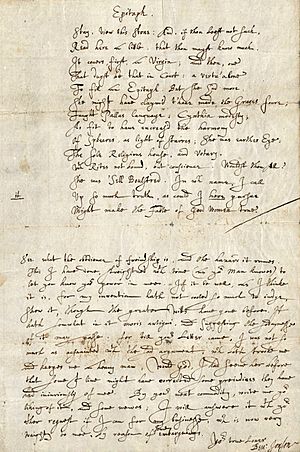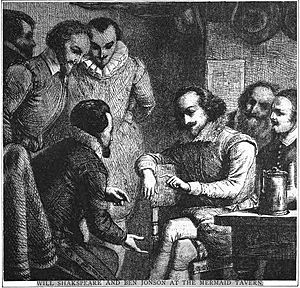Ben Jonson facts for kids
Quick facts for kids
Ben Jonson
|
|
|---|---|

Ben Jonson (c. 1617), by Abraham Blyenberch; oil on canvas painting at the National Portrait Gallery, London
|
|
| Born | Benjamin Jonson c. 11 June 1572 Westminster, England |
| Died | c. 16 August 1637 (aged 65) London, England |
| Occupation | Playwright, poet |
| Language | Early Modern English |
| Alma mater | Westminster School |
| Period | before 1597–1637 |
| Literary movement | English Renaissance |
| Spouse | Ann Lewis |
| Children | 2 |
| Signature | |
 |
|
Benjamin Jonson (born around June 11, 1572 – died around August 16, 1637) was a famous English playwright and poet. His creative work had a lasting impact on English poetry and stage comedies. He helped make the "comedy of humours" popular. He is best known for his funny plays that made fun of society. These include Every Man in His Humour (1598), Volpone, or The Fox (around 1606), The Alchemist (1610), and Bartholomew Fair (1614). He also wrote beautiful poems. Many people see him as the second most important English playwright after William Shakespeare during the time of King James I.
Contents
Early Life and Education

Ben Jonson once said that his grandfather was a gentleman who served King Henry VIII. His family name was originally spelled "Johnstone" or "Johnstoun." Over time, it changed to "Johnson," but Ben Jonson preferred to spell it "Jonson."
Jonson's father died a month before Ben was born. His mother later married a bricklayer. Ben went to school in London. A family friend helped him study at Westminster School. There, he learned from William Camden, a famous historian and scholar. Camden had a big influence on Jonson's writing style. They remained friends until Camden passed away in 1623.
After Westminster School in 1589, Jonson was supposed to go to University of Cambridge. But he became an apprentice to his bricklayer stepfather instead. He even built a garden wall in London. Later, Jonson went to the Netherlands and joined English soldiers fighting in Flanders. He even fought and defeated an enemy soldier in a one-on-one combat.
Becoming a Playwright
After his time as a soldier, Jonson returned to England. He worked as an actor and started writing plays. As an actor, he played the main character in The Spanish Tragedy. By 1597, he was writing plays for Philip Henslowe, a top theater producer. In 1598, his play Every Man in His Humour made him a well-known writer.
Jonson married a woman named Ann Lewis in 1594. They had children, but sadly, their eldest daughter, Mary, died in 1593 when she was six months old. Their eldest son, Benjamin, died in 1603 from the bubonic plague at age seven. Jonson wrote a sad poem called "On My First Sonne" about his son's death. Another son, also named Benjamin, died in 1635.
Jonson sometimes faced legal problems. In 1597, a play he co-wrote, The Isle of Dogs, caused trouble and was stopped. Jonson was put in Marshalsea Prison for a short time. A year later, he was briefly jailed again in Newgate Prison. This was after he was involved in a fight where someone died. He was found guilty but was released with a special legal help.
While in jail, Jonson became a Catholic. But in 1610, he decided to return to the Church of England.
In 1598, Jonson had a big success with Every Man in His Humour. This play was very popular. William Shakespeare was one of the actors in it. Jonson then wrote Every Man out of His Humour in 1599. He also wrote plays that made fun of other writers, like Cynthia's Revels and Poetaster. This period was known as the "War of the Theatres." Eventually, everyone made up. Jonson even worked with another writer, Thomas Dekker, to welcome King James I to England in 1603.
Working for the King
When King James I became king in 1603, Jonson became very popular at court. He started writing special shows called masques for the king and queen. These shows combined speeches, dancing, and amazing scenery. The Masque of Blackness (1605) was one of his famous masques.
Jonson often worked with the designer Inigo Jones on these masques. Their work was not always peaceful, as they sometimes disagreed. Because of his new work for the court, Jonson stopped writing plays for public theaters for about ten years. He later said he earned very little money from all his plays.
In 1616, King James I gave Jonson a yearly payment. This led some people to call him England's first Poet Laureate. This royal favor encouraged him to publish his collected works in a large book that year.
In 1618, Jonson walked from London to Edinburgh, Scotland. He was welcomed warmly everywhere he went. He stayed with the Scottish poet William Drummond of Hawthornden. Drummond wrote down many of their conversations. These notes show Jonson was a confident person who liked to talk about himself.
After returning to England, Jonson received an honorary degree from Oxford University.
The years between 1605 and 1620 were Jonson's most successful. He wrote his most famous plays during this time. These include the comedies Volpone (1605), Epicoene, or the Silent Woman (1609), The Alchemist (1610), and Bartholomew Fair (1614). The Alchemist and Volpone were instant hits. Even though his life was more stable, he still faced money challenges.
Later Years and Legacy
Jonson's writing slowed down in the 1620s. But he was still well-known. Younger poets, like Robert Herrick and Richard Lovelace, looked up to him. They were called the "Sons of Ben."
Jonson started writing plays for public theaters again, but they were not as popular as his earlier works. For example, The Staple of News gives a look at early English journalism. His play The New Inn was not well-received at all. This made Jonson write a poem complaining about his audience.
When King James I died in 1625 and King Charles I took over, Jonson felt less important at court. He also had a big disagreement with Inigo Jones, which hurt his career as a masque writer. However, King Charles I still cared for Jonson. He increased Jonson's yearly payment and gave him wine and beer.
Even though he had health problems in the 1620s, Jonson kept writing. When he died in 1637, he was working on a new play called The Sad Shepherd. This play showed a new direction for his writing, moving towards a type of play about country life.
Ben Jonson died around August 16, 1637. His funeral was held the next day, and many important people attended. He is buried in Westminster Abbey. His grave has the famous words "O Rare Ben Johnson" carved on it. Some people think this means "O rare Ben Jonson," celebrating his unique talent. Others think it might mean "Pray for Ben Jonson," referring to his Catholic beliefs at one point.
A monument to Jonson was put up in Westminster Abbey's Poets' Corner around 1723. It has a picture of him and the same inscription as his gravestone.
Jonson's Works
Plays
Jonson wrote mostly comedies for public theaters, except for two tragedies, Sejanus and Catiline, which were not very popular. His early plays, often written for boy actors, had simpler plots. But even then, he showed a great ability to spot funny and fake behavior.
His most famous comedies are set in London and deal with themes like trickery and money. Jonson wanted his plays to teach lessons while also entertaining. He often used characters that represented common types of people. His plays were known for their detailed plots. Some people, like the poet Samuel Taylor Coleridge, thought The Alchemist had one of the best plots in literature.
Poetry
Jonson's poetry also shows his deep knowledge of classical literature. Many of his well-known poems are based on Greek or Roman works. They all show his careful attention to how words are used and how poems are structured. Jonson used rhyme and rhythm to create poems that were simple, controlled, and precise.
His "Epigrams" (published in 1616) were short poems, often satirical, making fun of things like courtiers or spies. But he also wrote epigrams of praise for specific people, like his teacher Camden. "On My First Sonne" is a very personal and emotional poem, even though it's listed among his epigrams.
"The Forest" poems, also in his first collected works, were mostly for his rich supporters. The most famous are his country-house poem “To Penshurst” and the love poem “To Celia” ("Come, my Celia, let us prove").
Underwood, published after his death in 1640, is a larger collection of different types of poems. It includes love poems, religious poems, and poems praising others, like his poem to Shakespeare.
Jonson and Shakespeare
There are many stories about the friendly competition between Jonson and Shakespeare. Jonson sometimes pointed out things he thought were silly in Shakespeare's plays. He also said that Shakespeare "wanted art," meaning he lacked some formal skill.
However, in his later writings, Jonson gave a more balanced view. He recalled actors saying Shakespeare never crossed out a line when he wrote. Jonson's response was, "Would he had blotted a thousand!" But he also said Shakespeare was "honest and of an open and free nature," with a great imagination. Jonson concluded that there was "more in him to be praised than to be pardoned." When Shakespeare died, Jonson famously said, "He was not of an age, but for all time."
Stories say Jonson and Shakespeare had debates at the Mermaid Tavern. It's clear they knew each other. Shakespeare's acting company performed many of Jonson's plays, and Shakespeare himself acted in at least two of them. However, we don't know exactly how close their personal friendship was.
Jonson's most important words about Shakespeare are in a poem he wrote for the first collection of Shakespeare's plays, called the First Folio. This poem, "To the Memory of My Beloved the Author, Mr. William Shakespeare and What He Hath Left Us", helped create the idea of Shakespeare as a natural genius. Jonson wrote that Shakespeare had "small Latine, and lesse Greeke," meaning he wasn't as formally educated in classics as Jonson. But the poem also says:
- Yet must I not give Nature all: Thy Art,
- My gentle Shakespeare, must enjoy a part.
This means that Shakespeare's skill and effort were also important, not just his natural talent. Many people see this poem as a heartfelt tribute to the "Sweet Swan of Avon," the "Soul of the Age!"
List of Jonson's Works
Plays
- A Tale of a Tub, comedy (around 1596, performed 1633, printed 1640)
- The Case is Altered, comedy (around 1597–98, printed 1609)
- Every Man in His Humour, comedy (performed 1598, printed 1601)
- Every Man out of His Humour, comedy (performed 1599, printed 1600)
- Cynthia's Revels (performed 1600, printed 1601)
- The Poetaster, comedy (performed 1601, printed 1602)
- Sejanus His Fall, tragedy (performed 1603, printed 1605)
- Eastward ..., comedy (performed and printed 1605), with John Marston and George Chapman
- Volpone, comedy (around 1605–06, printed 1607)
- Epicoene, or the Silent Woman, comedy (performed 1609, printed 1616)
- The Alchemist, comedy (performed 1610, printed 1612)
- Catiline His Conspiracy, tragedy (performed and printed 1611)
- Bartholomew Fair, comedy (performed 1614, printed 1631)
- The Devil is an Ass, comedy (performed 1616, printed 1631)
- The Staple of News, comedy (completed by 1626, printed 1631)
- The New Inn, or The Light Heart, comedy (licensed 1629, printed 1631)
- The Magnetic Lady, or Humours Reconciled, comedy (licensed 1632, printed 1641)
- The Sad Shepherd, pastoral (around 1637, printed 1641), unfinished
Masques and Entertainments
- The Coronation Triumph (performed 1604, printed 1604)
- A Private Entertainment of the King and Queen on May-Day (1604, printed 1616)
- The Entertainment of the Queen and Prince Henry at Althorp (1603, printed 1604)
- The Masque of Blackness (1605, printed 1608)
- Hymenaei (1606, printed 1606)
- The Entertainment of the Kings of Great Britain and Denmark (1606, printed 1616)
- The Masque of Beauty (1608, printed 1608)
- The Masque of Queens (1609, printed 1609)
- The Hue and Cry After Cupid (1608, printed around 1608)
- The Speeches at Prince Henry's Barriers (1610, printed 1616)
- Oberon, the Faery Prince (1611, printed 1616)
- Love Freed from Ignorance and Folly (1611, printed 1616)
- Love Restored (1612, printed 1616)
- A Challenge at Tilt, at a Marriage (1613/1614, printed 1616)
- The Irish Masque at Court (1613, printed 1616)
- Mercury Vindicated from the Alchemists (1615, printed 1616)
- The Golden Age Restored (1616, printed 1616)
- Christmas, His Masque (1616, printed 1641)
- The Vision of Delight (1617, printed 1641)
- Lovers Made Men (1617, printed 1617)
- Pleasure Reconciled to Virtue (1618, printed 1641)
- For the Honour of Wales (1618, printed 1641)
- News from the New World Discovered in the Moon (1620, printed 1641)
- Pan's Anniversary, or The Shepherd's Holy-Day (1620, printed 1641)
- The Gypsies Metamorphosed (1621, printed 1640)
- The Masque of Augurs (1622, printed 1622)
- Time Vindicated to Himself and to His Honours (1623, printed 1623)
- Neptune's Triumph for the Return of Albion (1624, printed 1624)
- The Masque of Owls at Kenilworth (1624, printed 1641)
- The Fortunate Isles and Their Union (1625, printed 1625)
- Love's Triumph Through Callipolis (1631, printed 1631)
- Chloridia: Rites to Chloris and Her Nymphs (1631, printed 1631)
- The King's Entertainment at Welbeck in Nottinghamshire (1633, printed 1641)
- Love's Welcome at Bolsover (1634, printed 1641)
Other Works
- Epigrams (1612)
- The Forest (1616), includes To Penshurst
- On My First Sonne (1616), a sad poem
- A Discourse of Love (1618)
- The Execration against Vulcan (1640)
- Horace's Art of Poetry, translated by Jonson (1640)
- Underwood (1640)
- English Grammar (1640)
- Timber, or Discoveries made upon men and matter (1641), a collection of his thoughts
- To Celia (Drink to Me Only With Thine Eyes), poem
Some of Jonson's writings have been lost over time. These include plays like The Isle of Dogs (1597) and several masques.
|
See also
 In Spanish: Ben Jonson para niños
In Spanish: Ben Jonson para niños




